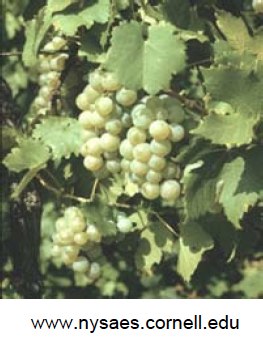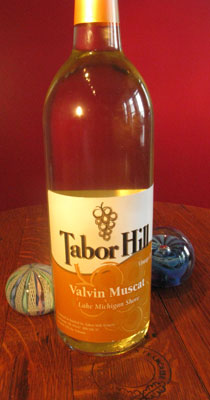Valvin Muscat is Midwest’s Hot Moscato
Moscato wine is making a comeback. According to Neilson sales data, Moscato sales doubled in both 2009 and 2010 and almost doubled again last year. A recent article in Palm Beach Illustrated also reported that E&J Gallo is selling six times as much Moscato wine as they did in 2008.
For Midwest winemakers seeking an aromatic wine with a distinct Muscat flavor that can grow in cooler climates, Valvin Muscat could be the answer. Bred by Dr. Bruce Reisch of Cornell University and released in 2006, it’s an interspecific white grape variety that is more cold hardy and disease resistant than vinifera muscat. Valvin Muscat has moderately large berries with thin skins, and small, compact clusters.
With its background of Vitis Vinifera and Vitis Rupestris, it is a cross between Muscat du Moulin and Muscat Ottonel. Research has shown this variety to be sensitive to phylloxera and is usually more productive when grafted.
Valvin Muscat is an early to mid-season variety, and grows well in a range of 2000-2200 growing degree days (GGD). According to Dr. Reisch, this varietal prefers warmer mid-continental areas, although it has been known to withstand temperatures of -14F. He adds that cold tolerance depends on how well vines are managed and the range of temperatures experienced annually.
In trials conducted by Purdue University, Valvin Muscat vines were planted in two sites in Indiana. The first site, near Vincennes, is a relatively warm region (USDA zone 6a/6b) of Southwest Indiana with well-drained soils. The other site, in West-Central Indiana near West Lafayette, is a colder site (zone 5b) with heavier soils. The research indicated that vine size and yields were lower at the cooler site. The heavier soil and damaging winter temperatures below -15F are believed to be the cause of lower yields in Northern Indiana. ‘It has been tested in warmer conditions where it makes an excellent wine,” Dr. Reisch stated.
Bernie Parker, vineyard manager at Oliver Winery in Bloomington, Indiana, said Oliver first planted Valvin Muscat in 2003 as one of the first commercial plantings in the U.S. Oliver currently has three acres of Valvin Muscat. He said that their vineyard has approximately the same number of GDD’s as Napa Valley. Based on his experience, a healthy number of GDD’s, along with plenty of sunlight are necessary to get this grape variety to ripeness. He says that while it has survived hard winters, Valvin Muscat is not necessarily a cold climate variety.
To continue reading this post, you must either subscribe or login.[login_form][show_to accesslevel=”annual-membership” ]
The 2010 Valvin Muscat crop at Oliver was damaged by spring frost but 2011 was a good harvest according to the winery’s website. However, Parker said the 2012 Valvin Muscat crop was heavily damaged by April freezes and the crop could be reduced by about 50%. “We have one of our Valvin Muscat blocks between two blocks of Traminette and the Valvin Muscat has more damage than either block of Traminette,” he said.
According to Parker, among the challenges of growing Valvin Muscat are short internodes, an abundance of secondary lateral fruit and more suckers growing from the base of the canes that must be continually removed than most other varieties. “Valvin Muscat is a lot of work,” Parker said, “but it’s worth it because Vavlin Muscat makes a really good wine.”
Parker states that their harvest is usually around late September, depending on the year. Past Valvin Muscat growing seasons at Oliver have averaged a pH of around 3.5 and a sugar content of around 21-22 brix. The soil in the vineyard at Oliver Winery is a loam with a limestone base.
 Parker said that when deciding the ideal time to harvest, the flavors of the grape are the primary consideration and weather conditions are secondary. Dr. Reisch echoed Parker’s comments about harvest timing. He said that harvest should occur when the peak of the Muscat flavor is reached, which is determined through tasting and experience. In Dr. Reisch’s research, Valvin Muscat was harvested at Cornell’s Geneva, New York Experiment Station between September 15th and 20th.
Parker said that when deciding the ideal time to harvest, the flavors of the grape are the primary consideration and weather conditions are secondary. Dr. Reisch echoed Parker’s comments about harvest timing. He said that harvest should occur when the peak of the Muscat flavor is reached, which is determined through tasting and experience. In Dr. Reisch’s research, Valvin Muscat was harvested at Cornell’s Geneva, New York Experiment Station between September 15th and 20th.
Mike Merchant, winemaker at Tabor Hill Winery in Buchanan, Michigan, also says that their Valvin Muscat is picked by taste. However, he states that Tabor Hill’s grapes usually reach maturity at 17-18 brix. After the grapes are crushed, Merchant allows them to sit on their skins overnight in a chilled tank. This makes for a wine in a dry or off-dry style.
Parker said that their Valvin Muscat normally goes through a cold stabilization, and is fermented cool to retain the Muscat aromas. With the brix level in the low 20’s, Parker said the finished wine is low in residual sugar although the fruitiness of the wine provides the perception of sugar for many tasters.
Parker states that the 180 or so cases of Valvin Muscat wine made at Oliver Winery normally sell out every year. He said that the qualities in Valvin Muscat that appeal to wine drinkers are the dry, fruity flavor and a floral aroma that is not too overpowering.
Merchant says that their wine is spicy and very aromatic in a way that most Muscat types exhibit. Tabor Hill makes 400-700 cases of Valvin Muscat per year, depending on the year. He added that it is a good seller and makes a good food wine. Their Valvin Muscat wine has won numerous awards, including a Silver Medal at the San Diego International Wine Competition in March 2012.
[/show_to][password-recovery-link text=’Lost Password? Click here for password recovery.’]



